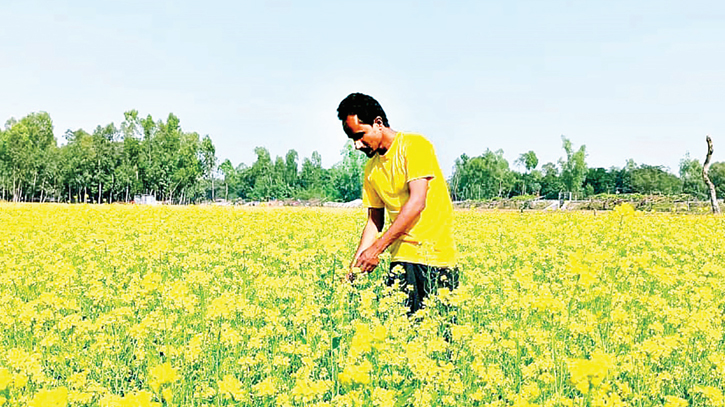
Photo : Messenger
Small-scale farmers in Chilmari of Kurigram are turning towards mustard cultivation as an additional crop with great potential for economic prosperity in the short time between Aman and Boro paddy cultivation.
Mustard seeds, sown with the incentive seeds and fertilizers provided by the Agriculture Department, will start growing in the farmers' houses after a few months. The Upazila Agriculture Department states that, given the favorable weather conditions, the yield is expected to meet projections.
According to information from the Agriculture Office, the target for mustard cultivation in the upazila this year was set at 1,609 hectares of land. However, the actual achievement surpasses the target, reaching 1,610 hectares. Farmers have been provided with three types of seeds, namely Bari-14, 15, and 17, by the Agriculture Department.
One such farmer benefiting from this initiative is Farhad Hossain from Ramna Union in the Upazila. After completing the paddy harvest, he diligently sowed the high-yielding Bari-14 variety of mustard on one bigha of land, encouraged by the incentives provided by the Agriculture Department. Anticipating a yield of 5 to 6 maunds of mustard per bigha, Farhad looks forward to fetching a market price ranging between 2500 to 2600 per maund. Remarkably, after the mustard harvest, he plans to utilize the same plot for cultivating Boro rice, demonstrating the efficiency of multi-crop farming.
Rabiul Islam, another farmer from the Patrakhata area, sheds light on the strategic advantage of cultivating mustard between Aman and Boro rice. This temporal gap allows for the cultivation of three different crops on the same plot, providing farmers with a steady stream of additional income. Rabiul envisions breaking free from the shackles of financial insecurity by capitalizing on this brief period of mustard cultivation.
Deputy Assistant Agriculture Officer Rafiqul Islam observes a growing interest among farmers in mustard cultivation, surpassing the levels of the previous year. Frequent visits to different areas under the guidance of the Agriculture Office have been instrumental in advising and encouraging farmers to engage in mustard cultivation, assuring them of positive results.
Reflecting on the achievement, Upazila Agriculture Officer Kumar Pranay Bishan Das expresses satisfaction that the mustard cultivation target has not only been met but exceeded, reaching 1,610 hectares. He attributes the growing demand for edible oil in the country as a driving force behind the increased interest in mustard.
To support this burgeoning trend, the Agriculture Office has distributed incentive seeds and fertilizers to 2,100 farmers, fostering optimism that this time, mustard yield will indeed be bountiful, resulting in substantial profits for the hardworking farming community. Kumar Pranay Bishan Das remains hopeful that mustard cultivation will witness a sustained increase in the upazila, laying the foundation for a prosperous future in agriculture.
Messenger/Rafi/Shahin








